At 22, New Deanery School Executive Director Has Years of Music and Theater Leadership Under His Belt
If you think a 22-year-old is too young to be an executive director of a new music school, you don’t know Rishi Wagle.
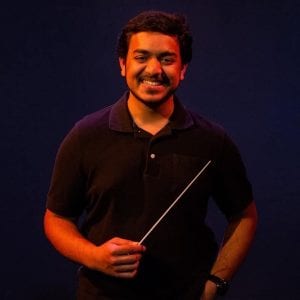
Wagle is a 2016 graduate of Pleasant Valley High and 2020 graduate of Brown University.
A bright, articulate and friendly 2016 Pleasant Valley High School alum and 2020 graduate of Brown University, Wagle was recently named the first head of the new Deanery School of Music, 1105 Main St., Davenport, whose founder and artistic director is Hannah Holman, principal cellist of the Quad City Symphony Orchestra and a busy teacher (including as cello instructor at University of Northern Iowa).
“Rishi, who went through substantial music education here in the Quad-Cities, also brings leadership skills from his work experience while at Brown University,” said Deanery board vice president Trish Duffy.
“He is passionate about the opportunity to increase the local offerings of music education and especially to those who have less access to those offerings,” she said last week. “His vision to help increase diversity in music by adhering to the possible interests of the students could increase our reach to the entire community.”
“That combination and breadth of accomplishment alone was really intriguing,” said Holman, who incorporated the nonprofit music school as the Quad City Music Academy, and signed a lease in December for the Deanery, a former residence for the Episcopal bishop. “I am so looking forward to working with him on the tasks before us.”
Among those tasks will be helping the board and its volunteers in raising money for building restoration and renovation, programmatic development, faculty recruitment and the development of a needs-and-talent driven scholarship fund and an instrument library.
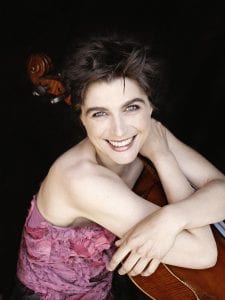
Hannah Holman is principal cellist of the Quad City Symphony.
The Deanery looked to add his position because Holman is very busy with her faculty positions, teaching and performing schedules, Wagle said recently.
“Ultimately, it’s just been a lot, I think, for her to balance, building this organization from the ground up with her already existing duties,” he said.
Wagle says it’s a really good fit for the new music school – for Holman to handle the artistic vision and faculty, and he handles the administration, logistics, fundraising, marketing and building maintenance.
The Deanery building – a 90-year old stone and concrete facility, whose original use was as a residence — has been vacant for over 10 years. It is about 5,500 square feet and will offer multiple-sized areas for instruction and performances. In December, the nonprofit entered into a 15-year lease with Trinity Episcopal Cathedral’s Vestry for the property.
It was originally was built as a residence for the Bishop, the chief cleric of a cathedral in the Episcopal Church. The Deanery was last used as a home in 2009. The church researched possible uses for the building which would be compatible with the church’s mission, ideally augmenting and enhancing it.
As a music school, it will be a venue for high-quality music instruction, performance and collaboration. Private and group lessons will be offered, initially in cello, violin, viola and bass for students seeking advanced training in preparation for careers in music.
Revealing his youth, Wagle said upon starting his job March 2: “I could not be more excited to begin working with Ms. Holman and the board on bringing our vision to fruition. There is no cause I value more than bringing music education to young musicians, and this is a
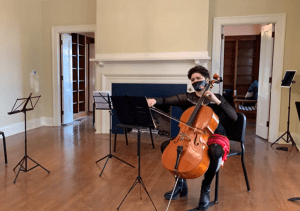
Holman, artistic director of the Deanery School of Music, playing in the building in December 2020.
tremendous opportunity to make a significant positive impact on the Quad-Cities community and its music students.”
“There are so many moving parts associated with an adventure like this that we feel it needs someone who is a quick learner with vision and experience to help the board,” Deanery board president Joseph Lohmuller said last week. “A lot of things need to happen in a relatively short time. We are very fortunate to have Rishi to guide and lead us.”
Christina Myatt, Pleasant Valley’s theater director, worked with Wagle all through his four years of high school, and since last October, when he came back to PV in several capacities to help stage their Covid-era productions – the musical “The Theory of Relativity,” the children’s show “The Velveteen Rabbit” and “Feiffer’s People” – a series of monologues and brief scenes performed before live audiences at the end of February, and streamed online March 5-6.
“I love Rishi’s truly collaborative spirit,” Myatt said recently. “I also love watching him with students. He is a marvelous educator. It is hard to name just one thing. I am impressed that Rishi uses his many talents to pursue his dreams and create opportunities. I am impressed that Rishi uses his talents to give back and benefit others. I am honored to call Rishi my colleague.”
A musical start at 3
Wagle (pronounced “WAH-glay”) – an Indian-American whose mother, Archana, is a violinist and on the Quad City Symphony board – started studying violin when he was 3, with the famed Suzuki method.
“At the time, I didn’t really know what was going on, and I didn’t really enjoy the violin too much,” he said recently. “I ended up dropping out
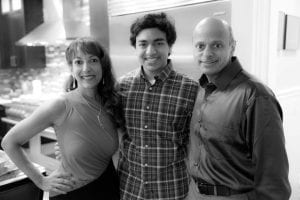
Rishi with his parents, Archana and Nikhil Wagle.
of that. Of course, when I got into fourth grade, I ended up picking up violin again. And then I liked it at that time. But in between, we had this upright piano in our house, and when I was four or five years old, I would always go and like, play the piano. “I had no clue what I was doing. And, my mom had done music and she played piano, and she noticed that I kept going over to the piano and playing random stuff,” Wagle recalled. He began piano lessons, really loved that, and had success in student piano competitions.
“Rishi’s entire childhood in the Quad-Cities was immersed in music and theater and it is exciting that he will be further exploring his passions,” his parents, Nikhil and Archana, said in a Sunday e-mail.
“From the moment he entered his first competition at the Baroque Festival at the age of 8 in 2006 and placed second, we knew that music would be a part of his life,” they said, noting Rishi won first place at the Baroque competition at every level and also placed first at state two times with the Iowa Music Teachers Association (IMTA), level C and D, one that very few students have ever achieved.
In 7th grade, in March 2011, Rishi became the first local piano student in recent memory to win his division twice at the IMTA state piano competition in Ames, Iowa. The honor was more unusual because he competed against students two and three years older.
“When I won level C, I thought ‘Oh my gosh, I won level C.’ I never expected it to happen again,” Rishi said in a 2011 interview. He sometimes

Rishi Wagle, left, with his parents and his brother, Keshav.
got nervous before playing but usually not during performances because he’s put a lot of time and effort into preparing.
“When I’m playing, I just let the music pretty much take over me,” 12-year-old Rishi said. “When I play, I don’t pay attention to my surroundings. I’m totally focused. I can’t help myself; I just smile.”
The legendary music producer, David Foster, once said that if one has the innate skill of perfect pitch, that person should consider a career in music, his father said Sunday. “Rishi does have perfect pitch, a skill that less than 1 in 10,000 people possess.”
He played violin in QCSO youth ensembles, including the inaugural year of the younger Prelude Strings (which goes until 8th grade) in 2009, and Youth Philharmonic Orchestra in 2012 – the latter a training group for the mainly high-school age Youth Symphony Orchestra. By the time Wagle was a junior at PV, he played violin in the YSO and would play piano for orchestral pieces that had a piano part, such as the Respighi “Pines of Rome,” which he played for the Side-by-Side QCSO concert during his junior year. “The piano part for that piece is pretty expansive. And there’s, like, this big solo in the third movement. And that was really fun to perform.” He competed in the Quad City Youth Symphony Orchestra concerto competition his senior year at PV, and won the YSO Prize, which allowed him to perform the first movement of the Mendelssohn Piano Concerto No. 1, with the YSO in 2016, “which was a really cool experience,” Wagle said.
An equal passion for theater
Not only has Rishi been skilled in music, his other passion is theater.
“Seeing him be involved in all the musicals at Pleasant Valley in junior high through high school was especially rewarding to see,” his parents said. “From his 8th grade performance as the sheriff in ‘Groovy,’ to Herman in ‘Sweet Charity’ to Bung Foo in ‘Thoroughly Modern Millie,’ to
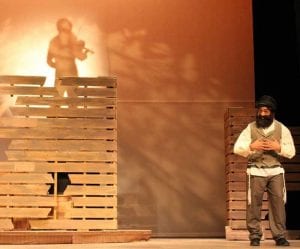
In his senior year at PV, Wagle played the lead Tevye in “Fiddler on the Roof.”
the Chairman in ‘Mystery of Edwin Drood,’ he grew as an actor and as a vocalist.
“All of those experiences led to one of the most remarkable performances we have seen him in which was the lead role, Tevye, in ‘Fiddler on the Roof’,” Nikhil and Archana said by e-mail.
“I actually worked on every show that PV did while I was a student there, in some form,” Rishi said recently. “I did a lot of acting, but I also did a lot of lighting design. And then did some sound engineering and stage management work as well as directing some shows when I was in high school.”
He said playing the iconic Jewish milkman Tevye in “Fiddler” in 2016 was a highlight.
“I think it was a really influential for me as an actor. I feel like because before I played Tevye, I felt like many of the rules that I played were sort of just like comedic relief for a show, or were meant to be sort of audience-pleasing roles,” Wagle said. “And it was the first character that I played where I really felt myself grow as an actor.
“I think throughout that process, I went to a much higher level that I had prior to that,” he said. “I really liked having the emotional arc, that I should be doing that show and really feeling in the moment as an actor, which is something that’s very important. And I feel like I hadn’t been able to fully achieve until that show.”
At Brown University, a private Ivy League school in Providence, R.I., Wagle majored in music with minors in theatre arts and computer science. He ended up being involved in nearly 50 shows there, including serving as technical director for a main performance venue, Alumnae Hall, for three years.
It’s a big, grand ballroom with a stage and seating capacity of 430.
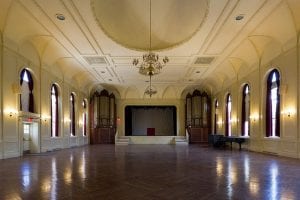
Alumnae Hall is a student-run performance space at Brown, an Ivy League school in Providence, R.I.
“It’s a space that is entirely student-run, which meant that I had to basically maintain all the equipment that was there,” Wagle said. “I served as kind of a third-party organizing figure between all the groups that used the space. It was my job to figure out what the schedule would look like for each season. since we have a very packed performance schedule in that season. Every spring at Brown, like from the last week and the February up until the end of the semester, there’s a show happening in there every single weekend.” “A big piece of it was also leading the strike and loading procedures for each of the transitions between shows,” he said. “I was also there to answer any questions that designers
who are coming to the space might have — whether that was the lighting designers, sound engineers or a set designers — about what they could or could not do in the space, as a resource for those for those people.”
Wagle’s folks thought Tevye would be his last acting performance, but while at Brown, as a freshman Rishi got to perform in his favorite musical of all time — Lin-Manuel Miranda’s “In The Heights,” and he played the Piragua guy.
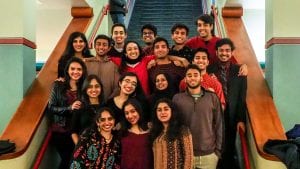
Wagle (far right along railing) with Brown Barsaat, the a cappella choir he directed.
“He continued on in college with many other theater opportunities and even stage managed other shows while on campus such as ‘Hedda Gabler’,” Nikhil said. “Luckily, right before Covid hit, he was able to direct for the first time his own show called ‘The Hanging Girl.’”
Rishi sang in the Brown Choir – traveling on tour to Ireland in spring 2019 – and in his sophomore year, started a South Asian fusion a cappella choir called Brown Barsaat (in Hindi, “barsaat” means rain shower). It grew from 12 to 23 members over his time there and mainly combined Bollywood Indian songs with American songs.
“We really worked on building membership and just building a selection of arrangements and fostering a really nice community of people as well,” Wagle said. “Throughout my time at Brown, I was able to take on a lot of leadership roles,” he said. “I was able to have a lot of different educational positions in different academic departments. And you can always do that at the universities where students are able to take a lot of initiative to make things happen on campus. And so Brown is a place that that embraces that.”
In his busy senior year, Wagle was music director and orchestrator for an original musical called “ABCD” (which stands for “American-Born
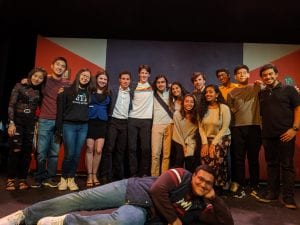
Wagle (far right) with the cast and crew of the original musical “ABCD” at Brown.
Confused Desi”), basically talking about what it’s like to be an Indian-American, in the United States. “Desi” comes from the Sanskrit “Desha,” meaning homeland. And stuck in the middle is the “Confusion,” referring to kids born in the States after their Indian parents immigrated.
“It was a really great experience to be able to music director for an original musical and also orchestrate the music for a pit orchestra, which was really a good experience,” Wagle said. In February 2020, before the pandemic shut things down, he was able to direct the unique immersive horror show, “The Hanging Girl.”
“It was an amazing show to work on. And it was very different than what you see from a lot of theater,” he said. “Generally, theater doesn’t like to touch the genre of horror, which is really just taken by films, and you don’t see a lot of horror theater happening. But it was a really amazing production to work on, and I was very thankful that I was able to put it up before the pandemic happened.”
“The staging of it was quite immersive in the sense that it was in-the-round style and the space was very intimate,” Wagle said. “The set also kind of made its way into the audience in in many ways. “A lot of it had to deal with the set design and the way that the stage was laid out,” he said. “I think like you were kind of experiencing the show as it was happening rather than watching it happen to other people.” “There was a lot of underscoring in the show that built tension. There was a lot with lighting and the set design, as well as the movement that the actors were doing,” Wagle said, noting he only had three weeks to rehearse it. “And the people who came to see the show were very impressed. I think, with the quality of the production.”
While at Brown, he also was a Coding Club instructor for the French American School of Rhode Island, and instructed Brown students in piano technique, coding skills, music theory and music composition.
A key role with Mississippi Bend Players
In the summer of 2019, before his senior year at Brown, he had an influential job as company stage manager for the Augustana-based Mississippi Bend Players – a professional summer stock at Brunner Theatre Center, Rock Island.
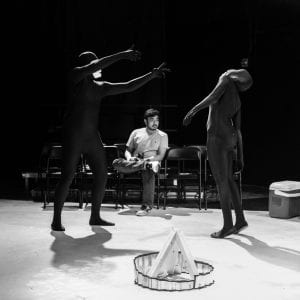
Wagle rehearsing “The Hanging Girl” at Brown University.
Wagle stage managed the productions of “Biloxi Blues, “A Green River” and the musical “Dames at Sea,” working closely with directors Cory Johnson, Phil McKinley and Shelley Cooper.
“My experience in all of these areas basically gave me a very strong sense of the holistic theatrical process and how all the pieces fit together,” he said, noting his varied background in acting, music, directing, design and tech work blended perfectly to help make the MBP shows come together. “All these pieces need to come together in an effective manner in order to make the show the best it can be,” Wagle said. “If you have somebody in the director’s chair who has been an actor in many things but has also been quite a bit with design and stage management, it just makes the process go a lot smoother because they’re able to very clearly see how all of the pieces need to come together in the most effective manner.
He likened the Deanery executive director role to being a stage manager, as the stage director is like the Deanery artistic director.
“It’s more logistical and is dealing more with implementing systems in place and, budgeting and things like that,” Wagle said of stage managing, who coordinates functions and schedules among cast and crew.
“The director is focused on the artistic vision and the stage manager is there to work on scheduling.” The stage manager is in charge of all lighting and sound cues, taking notes during rehearsals, and making sure they all happen during the performances. “They’re basically dictating over a headset to the people that are running each of these, when each of these things need to happen in order to make the show happen on time,” Wagle said. “During the shows, I was the person who is making sure that all the actors were there on time and that the show started on time and then executing all the cues that needed to happen in the show to make sure that it was the same from night to night. And then you also send a performance report afterwards to all the designers.”
Sad ending at school, new beginning
At Brown, he wrote a mini-musical (25-30 minutes) his senior year, that was supposed to be performed in a full-length way the weekend in March 2020 that Brown decided everyone had to come off campus and all events would be cancelled.
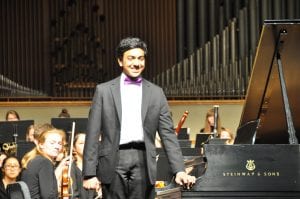
As winner of the YSO Prize, Wagle played the first movement of the Mendelssohn First Piano Concerto with the Quad City Youth Symphony.
“So the full production didn’t exactly get to go up, but there was kind of a more casual performance of the script in the last day that any performances were allowed on campus, in mid-March,” Wagle said of his senior capstone project. He also was in rehearsals for a production of “Cabaret,” that he was music directing, which never got to be performed because of the pandemic.
“For people that were working on projects during that senior time, I think it was definitely disheartening,” Wagle said of leaving campus. “Like one of my friends in the music department had composed an entire symphony as his senior thesis, and the Brown University Orchestra was going to perform his symphony at the next concert, and that got cancelled. And I mean, the amount of work that it takes to write a symphony is enormous.”
“I was so sad on behalf of my friend who didn’t get the opportunity to perform it,” he said, Like all 2020 graduates, Wagle didn’t get a proper in-person commencement; Brown had a ceremony online and graduates were mailed their diplomas. “Honestly, I don’t think I was as devastated about missing the commencement. It would have been nice to have, like, a graduation ceremony,” he said. “And I think especially it would have been better to have senior year experiences towards the end of my second semester that ultimately got cancelled. There’s a lot of traditions that happened, or the things that seniors do right before they graduate and all that got

A production at Brown’s Alumnae Hall.
cancelled.
“And that was unfortunate,” Wagle said. “I think I was more disheartened, though by just that I put a lot of time and thought into looking at what I wanted my career post-college to look like.”
One job he lost last summer was being music director for the 2020 season of Clinton Area Showboat Theatre, as its season was cancelled. Wagle worked as an online tutor for Saga Education — from August 2020 to January 2021 – an AmeriCorps fellow, he created and taught a math curriculum for 9th-grade Chicago students of low-income and underprivileged backgrounds. He also worked at PVHS since October 2020, as pianist for the production of “Theory of Relativity,” as well as its lighting and sound coordinator. The latter two functions he also served for “Feiffer’s People.”
“I think that right now there’s obviously a lot of speculation about live performance and about the safety of everybody who might be engaging in any performance,” Wagle said. “Personally, when I go into PV, I do feel like very safe. And I think part of that is because of all the practices that Christina and also PV is a school district that mandated masks for everybody regardless and trying to distance as much as we can.
“I also think part of it is that I think the students in the department have an understanding that they need to take the pandemic seriously,”

A production at Brown’s Alumnae Hall, where Wagle was technical director.
he said, noting most people don’t get Covid from their workplace or school.
“Most of the time, Covid spreads through like interpersonal gatherings in which people choose to be together or from them going to restaurants, not having masks on and such. And I think the students in the department understand that by engaging those things like, it may prevent them from being able to work on theater at all. So they choose to live their lives more safely, which has made it so. We haven’t had too many cases in the department at PV, which you think also contributes to the feeling of safety that I feel when I do go into work.”
Wagle has been proud to give back to PV as an alum.
“I absolutely love it. I mean, PV is where I got all of my foundational skills as a theater maker,” he said. “Then I was able to bring that to Brown and found that my skills that I gained from working at PV were comparable to people who had gone to elite performance academies and Los Angeles in New York. “Anything I can do in order to give back to the department, which I feel like has some very dedicated students and has a lot of potential to bring people who might want to do something like this professionally — anything I can do in order to make an impact in a positive way of the department is very gratifying,” Wagle said. “And I mean, I just I love teaching. I really do. And it’s really fulfilling to be able to work with students who are dedicated and also to just watch them grow.”
He had a tremendous experience with “Feiffer’s People,” in which he created a multimedia, immersive show with sound, lights and projections (including finding music for underscoring) to create a unified production, with the help of two students on crew. “We were able to come up with collaboratively, in my opinion, an effective underscoring for the show that greatly improved the production quality, and the immersion the audience would feel in watching it,” Wagle said. “That kind of went along with the lights, which also dictated the mood. Then the projections, which we also created, so that in the transitions that were happening in between each of the scenes, the audience had some pretext for what the next scene would look like.” “It all worked together to sort of create to really move the audience’s attention from scene to scene,” he said.
Looking to the Deanery future
Wagle can partially thank his mom for his new job with the Deanery School of Music, for recommending him to Holman and the school’s board. Archana Wagle is on the educational committee of the Quad City Symphony board and Rishi wants to foster a collaborative relationship with the QCSO since it has its own private lessons program.
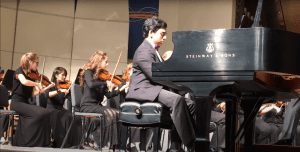
As a high school senior in 2016, Wagle performed the first movement of the Mendelssohn Piano Concerto No. 1.
“He gained immeasurable leadership training while serving on Brown’s Musical Forum Board and the daily operations of Alumnae Hall at Brown,” Rishi’s parents said by e-mail. “All these experiences combined have not only made these two parents incredibly proud but will make him well positioned for the position of executive director of the Deanery School of Music.
“It is a unique and exciting opportunity for him to create, nurture and lead in the very community that supported his musical and theatrical growth,” they said.
“We don’t want to be seen as competitors, necessarily, to the Quad City Symphony,” Rishi said. “We want to be seen as collaborators with the Quad City Symphony in bringing and increasing the opportunities for music education here in the Quad-Cities.”
He wants to partner in a positive way with the symphony.
“I think the most important element to this is transparent communication between the two groups and constant open communication, because we don’t want any ill will to be happening in either organization based on like rumors about feelings for the other organization, if that makes sense.” He hopes the Deanery will serve a need for students who can’t afford lessons and want to play music other than classical,
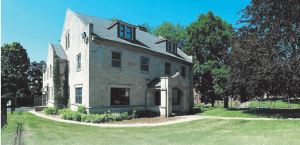
The 90-year-old Deanery is a former residence at 1105 Main St., Davenport.
while encouraging them to take part in the symphony’s youth ensembles. “One of the things we’re potentially looking at, at the Deanery School of Music is offering music courses that are not necessarily fully classically focused, which also ties back to one of our other goals, which is increasing our offerings with diversity and music students that we see here in the Quad-Cities and giving opportunities to people who may not be able to afford these lessons,” Wagle said. “Unfortunately, as much as I love classical music and I’m a classical musician myself – but it has a history of elitism, which can be sort of off-putting many times to students of diverse backgrounds,” he said.
The Deanery will offer instruction beyond classical, as a way to increase the diversity of music students, support students from varied backgrounds and “also differentiate our program as more from what the symphony might be offering with the private lesson program,” Wagle said. Music lessons will be available on a sliding fee scale based on economic need.
With faculty from around the country, the school can offer broader virtual lessons (which it currently does), as well as serve students outside the Q-C. Wagle is focusing on raising money for the $200,000 building renovation; half has been raised so far. That includes The Hubbell-Waterman Foundation construction matching grant of $50,000, which was matched. Donors are encouraged to sponsor the renovation of a particular room in the building or a particular lesson studio, Wagle said. “That studio would be branded then with the donor’s name for whoever wanted that to be named for them and sponsor that room.”
For more information on the school, visit www.quadcitymusicacademy.org/.



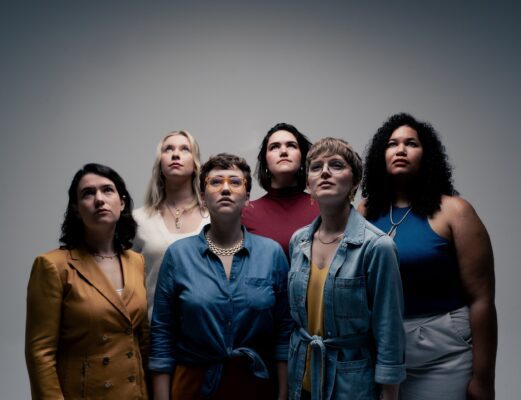

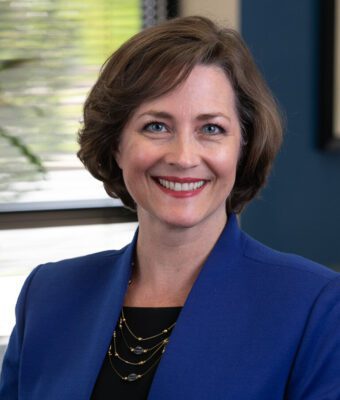







Leave a Reply
You must be logged in to post a comment.